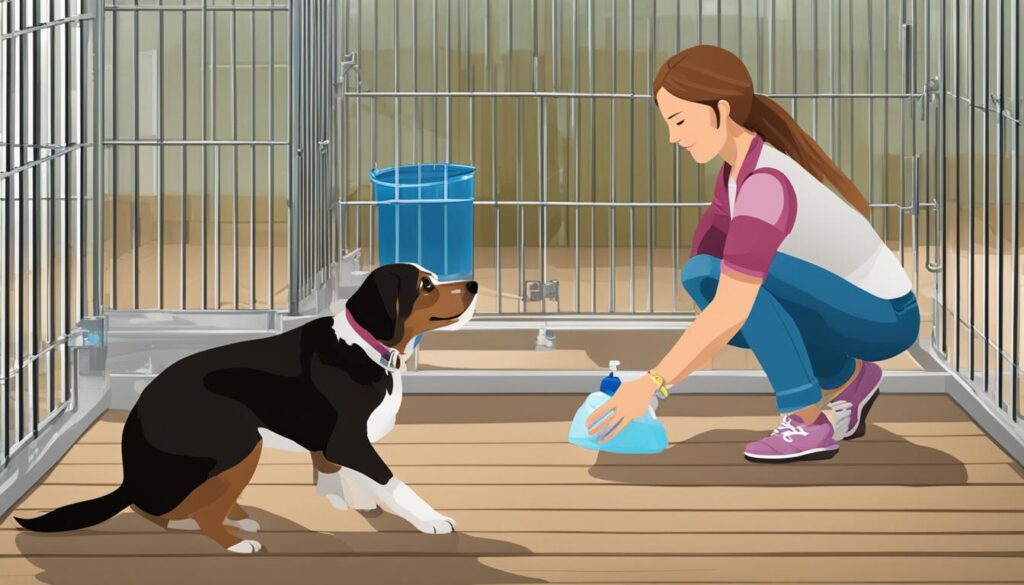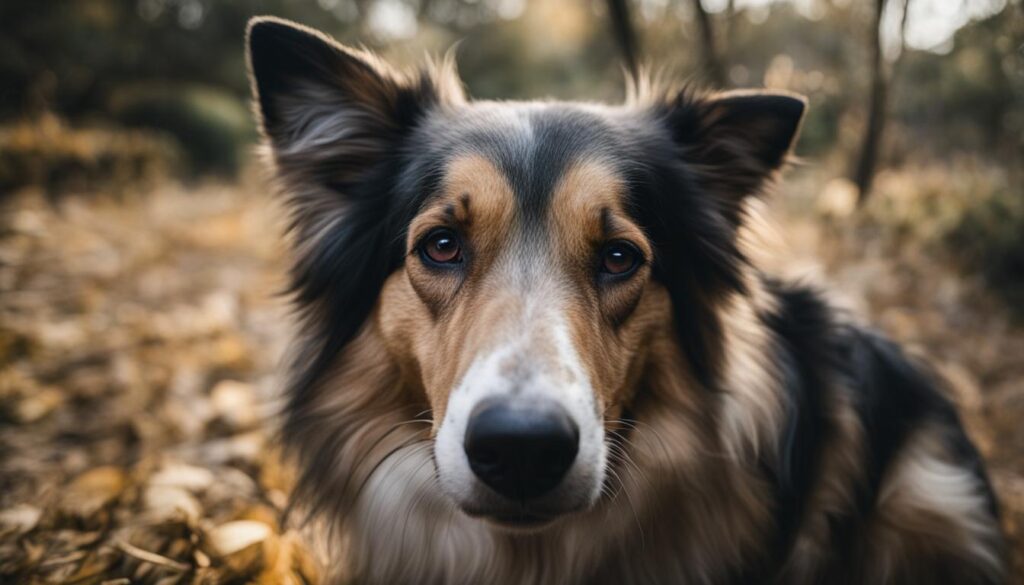As a responsible pet owner, it’s important to be aware of the various health issues that can affect your furry friend. One such condition that you need to be familiar with is kennel cough in dogs. This highly contagious respiratory disease is caused by a number of factors, including viruses and bacteria, and can be easily transmitted from one dog to another. It’s crucial for pet owners to understand the symptoms of kennel cough and know the best treatment options available to ensure their pet’s health and wellbeing.
Key Takeaways:
- Kennel cough is a contagious respiratory disease in dogs caused by a variety of factors, including viruses and bacteria.
- Pet owners should be aware of the symptoms of kennel cough, which can include coughing, sneezing, lethargy, and loss of appetite.
- There are various treatment options available for kennel cough in dogs, including medication, rest, and supportive care measures.
- Preventive measures, such as vaccinations and avoiding exposure to infected dogs, can help reduce the risk of your dog contracting kennel cough.
- The kennel cough vaccine is an important preventive measure that can protect your pet from this contagious respiratory disease.
What is Kennel Cough?
If you’re a dog owner, you may have heard of kennel cough. It is a highly contagious respiratory disease that affects dogs of all ages, but is most commonly found in puppies, senior dogs, and those with weakened immune systems.
Kennel cough is scientifically known as canine infectious tracheobronchitis. It is caused by a combination of bacteria and viruses, with Bordetella bronchiseptica being the most common bacteria involved in its development. The virus is referred to as canine parainfluenza virus, adenovirus type 2, and canine respiratory coronavirus.
Kennel cough gets its name because it is often contracted in places where dogs congregate in close quarters, such as boarding facilities and dog parks. However, it can also be contracted through contact with infected dogs, contaminated surfaces, or through the air.


While kennel cough is not typically a serious condition, it can lead to more severe respiratory issues if left untreated. It is essential that pet owners understand the symptoms of kennel cough, and seek prompt treatment if necessary, to ensure a speedy recovery for their furry friends.
Recognizing Symptoms of Kennel Cough in Dogs
If you suspect that your dog may have kennel cough, it is important to recognize the symptoms. Dogs with kennel cough typically exhibit a persistent, dry cough that may sound like a honking noise. This cough is often accompanied by retching and gagging, and may be more pronounced after exercise or excitement.
In some cases, dogs with kennel cough may also experience nasal discharge, lethargy, and a decreased appetite. If your dog exhibits any of these symptoms, it is important to seek veterinary care promptly.
It is worth noting that while kennel cough is typically a mild illness, it can sometimes progress to more serious respiratory infections, particularly in young puppies or older dogs with weak immune systems. Therefore, it is essential to keep an eye on your dog’s symptoms and seek treatment as necessary.
In addition to seeking veterinary care, you can help alleviate your dog’s symptoms by providing a comfortable, low-stress environment for them to rest and recover in. Avoid exposing your dog to other dogs or environments that may exacerbate their illness.


Tip: Be sure to inform your veterinarian if your dog has recently been exposed to other dogs, such as at a boarding facility or dog park. This can help them make a more accurate diagnosis and provide appropriate treatment.
Treatment Options for Kennel Cough in Dogs
If your dog has been diagnosed with kennel cough, it is important to seek treatment promptly. While in most cases, the condition resolves on its own within a few weeks, treatment can help alleviate symptoms and speed up the recovery process.
Treatment for kennel cough in dogs may include:
| Treatment | Description |
|---|---|
| Antibiotics | If the underlying cause of kennel cough is bacterial, your vet may prescribe antibiotics to treat the infection. It is important to complete the full course of antibiotics as prescribed, even if your dog’s symptoms improve. |
| Cough suppressants | Cough suppressants may be prescribed to help relieve your dog’s cough and make them more comfortable. However, it is important to not suppress the cough too much, as coughing helps clear the airways of mucus and other irritants. |
| Rest | It is important to give your dog plenty of rest during their recovery. Avoid activities that may exacerbate their symptoms, such as excessive exercise. |
| Humidifier | A humidifier can help alleviate your dog’s cough by moisturizing the air and reducing irritation in the respiratory tract. |
| Symptomatic treatment | Your vet may recommend additional symptomatic treatment, such as eye drops or supplements, to help relieve your dog’s symptoms and aid in their recovery. |
It is important to consult with your veterinarian to determine the best treatment options for your dog’s specific case of kennel cough. Additionally, it is important to follow your vet’s instructions closely to ensure the most effective treatment and best outcome for your furry friend.


Prevention and Transmission of Kennel Cough
Preventing kennel cough in dogs involves taking certain precautions. One of the most effective ways to prevent kennel cough in dogs is to ensure that your pet is vaccinated against the disease. The kennel cough vaccine is typically given annually to help prevent the onset of the disease.
In addition to vaccination, you can also take other measures to prevent kennel cough in dogs. These may include avoiding contact with sick dogs, keeping your pet away from crowded or poorly ventilated areas, and practicing good hygiene by washing your hands after handling other animals.
It is important to note that kennel cough is a highly contagious respiratory disease that can be easily transmitted from one dog to another. This can occur through direct contact with an infected dog, as well as through contact with contaminated surfaces, such as food bowls or water dishes.
Furthermore, kennel cough can spread quickly in environments where dogs are kept in close proximity to each other, such as kennels, dog parks, and grooming facilities. Pet owners should be aware of their pet’s surroundings and take necessary precautions to minimize the risk of transmission.
Transmission of Kennel Cough
The transmission of kennel cough in dogs can occur in a number of ways. The most common method of transmission is through direct contact with an infected dog. This may occur when dogs come into close proximity with each other, such as during play, grooming, or sharing food and water bowls.
Kennel cough can also be transmitted through airborne particles, such as when an infected dog coughs or sneezes. These particles can remain in the air for a short period of time, making it possible for other dogs in the area to inhale them and become infected.
It’s also worth noting that kennel cough can be transmitted through contaminated surfaces. For example, if an infected dog drinks from a water bowl and then another dog drinks from the bowl, the second dog may contract the disease.


To prevent the transmission of kennel cough in dogs, it is important to take appropriate precautions. This may include vaccinating your pet, avoiding contact with sick dogs, and practicing good hygiene. By taking these steps, you can help protect your pet from this highly contagious respiratory disease.
Conclusion
As a responsible pet owner, you must understand the risks and symptoms of kennel cough in dogs. Vaccinations, such as the kennel cough vaccine, are critical in preventing this contagious respiratory disease from spreading. Timely treatment and supportive care measures can help alleviate symptoms and aid in recovery.
Protecting Your Dog from Kennel Cough
Preventing the spread of kennel cough is crucial to ensure the health of your dog and others in the community. Vaccination is the most effective method of preventing kennel cough. Speak with your veterinarian about the appropriate vaccination schedule for your dog based on age, lifestyle, and health history.
Understanding the Contagious Nature of Kennel Cough
Kennel cough is highly contagious and can spread through direct contact with infected dogs or contaminated objects and surfaces. If your dog exhibits symptoms of kennel cough, such as coughing, sneezing, and nasal discharge, isolate them from other dogs and seek veterinary care promptly. Keep your dog away from crowded areas, such as dog parks, boarding facilities, and grooming salons, where the risk of transmission is higher.
By staying informed and following preventive measures, you can help protect your furry friend from this contagious respiratory disease in dogs.
FAQ
What are the symptoms of kennel cough in dogs?
The symptoms of kennel cough in dogs can vary but commonly include a persistent cough, a honking sound, sneezing, nasal discharge, and fatigue. Some dogs may also experience a loss of appetite or a mild fever.
How is kennel cough transmitted?
Kennel cough can be transmitted through direct contact with an infected dog, as well as through contaminated surfaces, such as water bowls or toys. It is highly contagious and can spread easily in areas with a high concentration of dogs, such as shelters, kennels, or dog parks.
Can kennel cough be prevented?
Yes, there are preventive measures that can help reduce the risk of kennel cough in dogs. Vaccination is one of the most effective ways to prevent the disease. It is important to keep your dog’s vaccinations up to date, especially if they are frequently exposed to other dogs in boarding facilities or social settings.
How is kennel cough treated?
Treatment for kennel cough in dogs typically involves supportive care measures to alleviate symptoms and promote recovery. This may include rest, proper hydration, and medication to relieve coughing or manage secondary infections. In severe cases, veterinary intervention may be necessary.
Can kennel cough be serious?
While kennel cough is usually a mild illness that resolves on its own within a few weeks, it can occasionally lead to more severe complications, especially in young puppies, elderly dogs, or dogs with pre-existing health conditions. It is important to monitor your dog’s symptoms and consult a veterinarian if you have concerns.
Can humans get kennel cough?
While it is very rare for humans to contract kennel cough, it is theoretically possible for the bacteria or viruses that cause kennel cough to affect humans, particularly those with weakened immune systems. However, it is much more common for kennel cough to affect dogs and other canine species.

